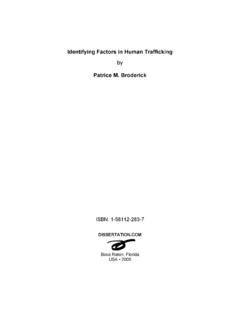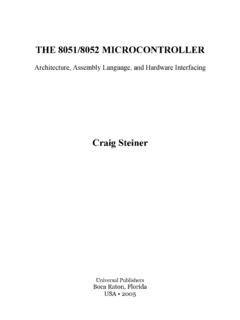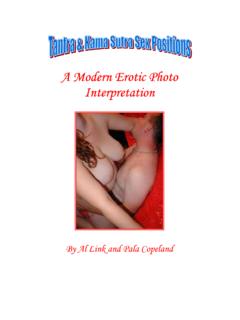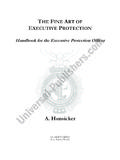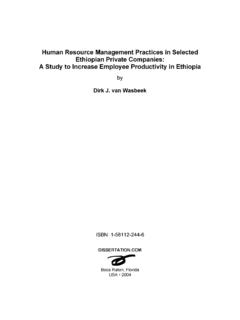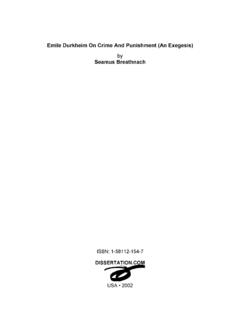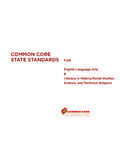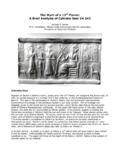Transcription of The Language System of English - Universal …
1 The Language System of English Vulf Plotkin BrownWalker Press Boca Raton 2006 The Language System of English First published as В. Я. Плоткин. Строй английского языка. Москва: Высшая школа, 1989. ISBN 5-06000-213-6. Copyright 2006 Vulf Plotkin All rights reserved. BrownWalker Press Boca Raton, Florida USA 2006 ISBN: 1-58112-993-9 (paperback) ISBN: 1-58112-992-0 (ebook) 3 Foreword This book is an outcome of five decades of my professional activities in exploring and teaching English as a foreign Language , which have given me a novel insight into its basic systemic properties.
2 My views on the subject might hopefully be of interest not only to my linguistic colleagues, but also to broader circles of Language learners, and to quite a few native speakers of the Language as well, for although a foreigner s mastery of the Language is bound to be wanting, this deficiency may be compensated by somewhat deeper penetration into the systemic mechanisms of the Language . Due to my intention to reach a wider readership not confined to expert linguists, this book is not a scholarly monograph equipped with the appropriate paraphernalia, like a historiography of the subject or bibliographical references.
3 As the volume of linguistic literature on the English Language is daunting, even the minimal reference list would probably be much longer than the book itself. In my opinion, the advent of the Internet with its hosts of powerful search tools has effectively freed authors from the need to corroborate any idea in their writings by citing its proponents and adherents. My linguistic colleagues will no doubt easily distinguish my contributions from ideas put forward by others long before me, whereas laymen are unlikely to care about who said what and when.
4 Therefore the few names of linguists mentioned below, whose classical works are well known to every scholar in this field, will not be accompanied by superfluous bibliographical references. Prof. Vulf Plotkin, (Philology) < > 5 Table of Contents Chapter I. The notion of a Language as a System ..7 1. A Language System and its structural pattern ..7 2. Language systems and Language types ..11 3. The typological characteristics of English ..14 Chapter II. The grammatical subsystem ..25 A. The sentence.
5 25 1. The sentence and the utterance ..25 2. Means of syntactical connection ..28 3. Word-order in sentences ..31 4. The structure of the verb predicate ..38 B. The word ..42 1. Parts of speech ..42 2. Grammatical categories ..48 3. Simple verb-forms ..51 4. Categories in the verb paradigm ..53 5. Analytic verb-forms ..68 6. The non-finite 7. Special verb classes ..74 8. The noun ..75 9. Pronouns ..82 Chapter III. Typological features in the lexical 1. The words with broad meaning ..93 2. Typological diversity in the vocabulary.
6 100 Chapter IV. The phonic 1. The distinctive features ..108 2. The phonemes ..111 7 Chapter I The notion of a Language as a System 1. A Language System and its structural pattern A Language , contrary to Noam Chomsky s well-known contention, is a System , a functionally determined, structured aggregate of elements. Since systems themselves are mostly elements of superior systems, a System occupies a certain rung on the hierarchical ladder and can be characterized as both a subsystem within the respective superior System and a System embracing several subsystems.
7 A System should therefore be characterized in its upward and downward relations within the systemic hierarchy. When only two systemic levels are considered, the designations System and subsystem are sufficient, but with more levels involved prefixal terms like macrosystem , microsystem , hypersystem , mini- System etc. have to be used. A Language serves as a subsystem not for one, but for two superior systems. One is the human mind, for which a Language is a tool shaping the mind s products in order to make them exportable to other minds.
8 Since the tools used by participants in this exchange between minds must be uniform, a Language System is an element not only of individual minds, but of the totality of minds in the entire Language community a social System comprising all the speakers of the Language . It should be emphasized that although a subsystem incorporated into a superior System cannot be independent of the latter, it is nevertheless an autonomous entity. There are three facets to every System : (1) the functional facet relating to the purpose it serves in the superior System as its element; (2) the substantive facet characterizing the substance of which the System builds its elements; (3) the structural facet Vulf Plotkin 8pertaining to the inner organization of the System , to the relations between the elements within it as well as between them and the System as a whole.
9 A System is evidently not independent of the superior System in its functional relation determined by the requirements of the latter. Neither is it fully independent in the choice of substance for its elements, which can obviously be built only of what is available for the purpose. Unlike these two facets, which relate a System to those two external domains, its internal structure is not directly determined by outside factors, and a System is highly autonomous in selecting the most suitable available substance, moulding it into elements and organizing them for optimal functioning in order to meet the requirements of the superior System .
10 A Language System comprises three subsystems: (a) the lexical subsystem containing thousands of words, whose function is to reflect the entire range of things and phenomena in the ambient world; (b) the grammatical subsystem, whose function is to arrange words into sentences reflecting thoughts exchanged in speech communication; (c) the phonic subsystem, whose function is to provide the items and products of the two other subsystems, words and sentences, with externalizable and transmissible sound shapes.

